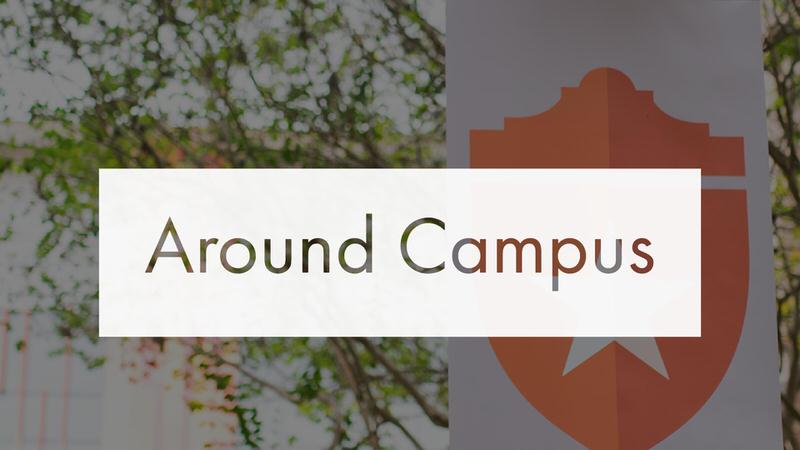Strategic Plan Update

Through a collaborative process during FY 2017, the Graduate School of Biomedical Sciences (GSBS) students, faculty, staff, and outside members of the community met with an external consultant to discuss and develop a five-year strategic plan for the school. These discussions identified shared goals and objectives that not only aligned with the overall UT Health San Antonio mission and values but also aligned with the overarching goals and strategies of the UT System as a whole. The GSBS strategic plan that was developed during this process includes three main goals:
- Goal 1: Foster a culture of community, collaboration and engagement of scholars
- Goal 2: Optimize structure and leadership for success
- Goal 3: Raise the bar in scholarship

Goal 1: Foster a culture of community, collaboration and engagement of scholars
During fiscal year, 2019, the Graduate School worked to reward and celebrate scholarly achievement of trainees, faculty, and staff. The GSBS created a new Mentor-of-the-Year award to reward outstanding mentorship in the Graduate School. In April 2019, an Academy of Mentors was created and the first recipient of the award, Dr. Ratna Vadlamudi, was honored as the inaugural member of the Academy. Additionally, Dr. Vadlamudi received a $7,500 award to be used towards supporting his research training program.
In August 2019, the Graduate School presented the Debbie Yrle staff award that was established to honor and recognize a GSBS staff member who provides outstanding support to the education and research mission of the Graduate School of Biomedical Science. The 2019 Debbie Yrle recipient was Heather Hunter.
In addition to celebrating faculty & staff achievements, the Graduate School created a new section called “In Press” in the The Pipette Gazette, the graduate school’s blog and newsletter. The “In Press” section will highlight first author student publications on a quarterly basis.
Goal 2: Optimize structure and leadership for success
In fiscal year 2019, The Graduate School of Biomedical Sciences worked to identify ways to enrich the graduate school’s mentoring capacity. Work is in progress to develop a Mentoring Guide with Hints for Success initiative that includes resources supported by NIH and NSF. Furthermore, the Graduate School has reviewed all doctoral programs to identify anticipations of growth over the next several years along with possible funding opportunities for first year students.
Goal 3: Raise the bar in scholarship
In fiscal year 2019, the Graduate School of Biomedical Sciences worked to provide a cutting edge, flexible curriculum that prepares students for success & fosters problem solving and critical thinking. In July 2019, the GSBS built a Business Intelligence Dashboard System that links to real time student information to aid program coordinators and GSBS Administration with student tracking & program information. Work has begun on the creation of additional interactive tools that include enrollment, graduation, & student achievement dashboards. Time to complete is fiscal year 2020. In addition, the GSBS has created an alumni website with a database to house alumni contact information and job placement data. Currently, there are over 2000 alumni on the database. The database houses a job board and is also used as a mentoring and networking tool that allows students to connect with alumni.
The Graduate School of Biomedical Sciences is also working to ensure our graduate programs are aligned with workforce needs regionally and nationally. The GSBS has developed an Advisory Board for the Career Advisory Council (CAC) and strategies are currently being designed to engage CAC members with the student population. A comprehensive list of CAC members, their industry and participation will be tracked moving forward. Gaps will be identified, and additional CAC members recruited as necessary. Furthermore, the GSBS has hired a new Director of Career Development that is currently working on initiatives that will support interactions and involvement of faculty & administrators with appropriate civic groups and trade associations to facilitate workforce discussions and connections for students.
In regard to recruitment, in 2019, the GSBS enhanced recruitment initiatives by working to encourage faculty and senior graduate students to be active recruiters at discipline specific science societies/meetings. The total GSBS matriculant count increased to 106 in 2019 from 92, in 2018, yielding a 15% increase. The Under Represented count increased to 32% from 17%. The GSBS continues to engage students in the recruitment process by inviting students to attend conferences to serve as resources for prospective students. GSBS plans to dedicate recruitment funds to aid students in traveling to large recruitment events.
Over the next three years, the Graduate School will continue to work towards achieving all goals and objectives in the 2018-2022 plan. Our progress toward realizing the goals will be shared with the GSBS community semi-annually. The Graduate School will meet with the Office of Strategic Planning regularly, to ensure the viability of the plan and modify accordingly.
For more information about the strategic plan, please contact Nancy Jones.
